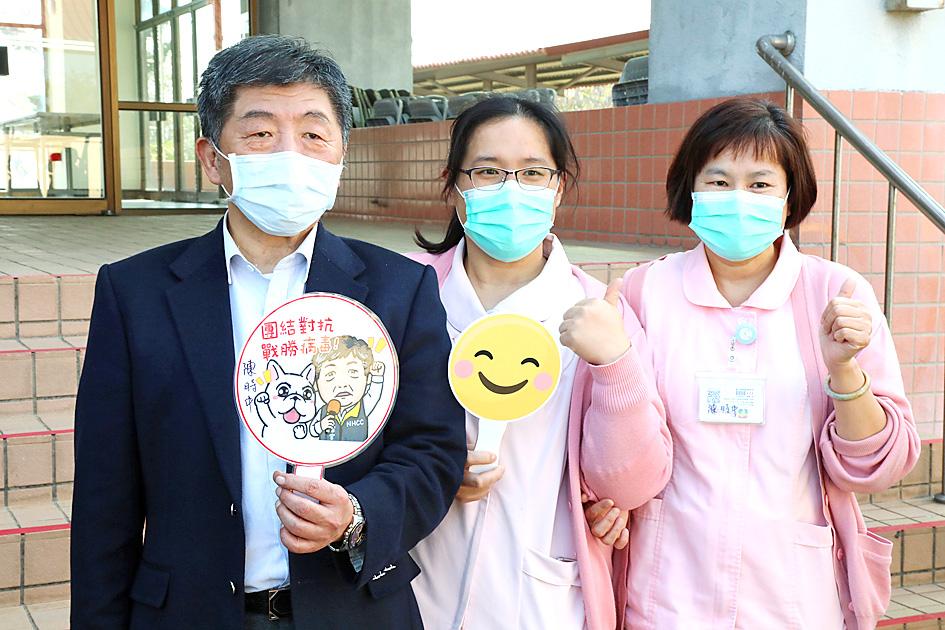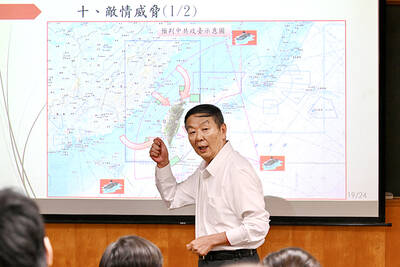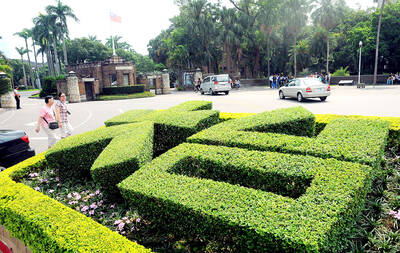The Central Epidemic Command Center (CECC) yesterday confirmed that the Food and Drug Administration (FDA) has issued emergency use authorization for the AstraZeneca COVID-19 vaccine from three factories, adding that it could be administered in about seven days after arrival in Taiwan.
FDA Director-General Wu Shou-mei (吳秀梅) said the agency approved the vaccine yesterday morning.
The vaccines could be administered as soon as seven days after they arrive in Taiwan, if all the required information is provided, but it could take up to 40 days if the factories provide incomplete documentation, she said.

Photo courtesy of the Chiayi County Government via CNA
At the CECC’s news conference in the afternoon, Minister of Health and Welfare Chen Shih-chung (陳時中), who heads the center, said that the vaccines must pass through three “checkpoints” before they can be administered to the public.
First, the vaccine must be determined to be effective, which it has since it received FDA approval, he said.
Second, vaccine manufacturing facilities must meet the required standards, he said.
Centers for Disease Control Deputy Director-General Chuang Jen-hsiang (莊人祥), who is the CECC’s spokesman, said that AstraZeneca vaccine factories in Germany, South Korea and Italy have been approved to export vaccines to Taiwan.
Third, the quantity and quality of the imported vaccines would be reviewed to ensure they are correct, Chen said.
“After the vaccines arrive, we will review the documents that the factories provide, but if they do not provide all the required documents for review, we will have to conduct examinations, which will take longer,” he said.
Asked to comment on reports in France and Sweden of health workers experiencing adverse effects possibly linked to the AstraZeneca jab, Chen said that the CECC is closely monitoring such reports and how health authorities respond to them.
However, there have been more doses of the AstraZeneca vaccine administered in the UK, and so far reports of adverse effects following vaccination have been limited, he said.
Taiwan would continue to follow the WHO expert group’s recommendation for the use of the vaccine — approved for all people 18 and older and also in settings where new variants of the virus are circulating — while monitoring the latest developments, he said.
Although reports of adverse events related to vaccines in other countries might cause public concern, Taiwan does not force the public to be vaccinated, and the center’s specialists would make the best recommendations according to scientific evidence, Chen said.
Meanwhile, the CECC yesterday reported one new imported case of COVID-19, a Filipino in his 20s who arrived in Taiwan on Feb. 3.
He stayed in a hotel with no symptoms, and tested positive in a paid test at a hospital on Thursday after ending quarantine, Chen said.

RETHINK? The defense ministry and Navy Command Headquarters could take over the indigenous submarine project and change its production timeline, a source said Admiral Huang Shu-kuang’s (黃曙光) resignation as head of the Indigenous Submarine Program and as a member of the National Security Council could affect the production of submarines, a source said yesterday. Huang in a statement last night said he had decided to resign due to national security concerns while expressing the hope that it would put a stop to political wrangling that only undermines the advancement of the nation’s defense capabilities. Taiwan People’s Party Legislator Vivian Huang (黃珊珊) yesterday said that the admiral, her older brother, felt it was time for him to step down and that he had completed what he

Taiwan has experienced its most significant improvement in the QS World University Rankings by Subject, data provided on Sunday by international higher education analyst Quacquarelli Symonds (QS) showed. Compared with last year’s edition of the rankings, which measure academic excellence and influence, Taiwanese universities made great improvements in the H Index metric, which evaluates research productivity and its impact, with a notable 30 percent increase overall, QS said. Taiwanese universities also made notable progress in the Citations per Paper metric, which measures the impact of research, achieving a 13 percent increase. Taiwanese universities gained 10 percent in Academic Reputation, but declined 18 percent

CHINA REACTS: The patrol and reconnaissance plane ‘transited the Taiwan Strait in international airspace,’ the 7th Fleet said, while Taipei said it saw nothing unusual The US 7th Fleet yesterday said that a US Navy P-8A Poseidon flew through the Taiwan Strait, a day after US and Chinese defense heads held their first talks since November 2022 in an effort to reduce regional tensions. The patrol and reconnaissance plane “transited the Taiwan Strait in international airspace,” the 7th Fleet said in a news release. “By operating within the Taiwan Strait in accordance with international law, the United States upholds the navigational rights and freedoms of all nations.” In a separate statement, the Ministry of National Defense said that it monitored nearby waters and airspace as the aircraft

UNDER DISCUSSION: The combatant command would integrate fast attack boat and anti-ship missile groups to defend waters closest to the coastline, a source said The military could establish a new combatant command as early as 2026, which would be tasked with defending Taiwan’s territorial waters 24 nautical miles (44.4km) from the nation’s coastline, a source familiar with the matter said yesterday. The new command, which would fall under the Naval Command Headquarters, would be led by a vice admiral and integrate existing fast attack boat and anti-ship missile groups, along with the Naval Maritime Surveillance and Reconnaissance Command, said the source, who asked to remain anonymous. It could be launched by 2026, but details are being discussed and no final timetable has been announced, the source